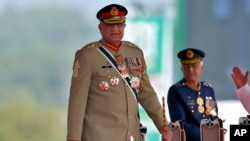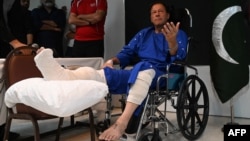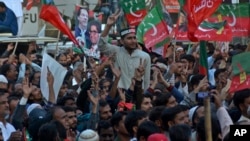Pakistan’s outgoing military chief acknowledged Wednesday that decades of “unconstitutional” interference in national politics by his powerful institution had periodically exposed it to public criticism.
General Qamar Javed Bajwa, who is due to retire next week, made the admission in a nationally televised address to families of fallen soldiers at the military headquarters in the garrison city of Rawalpindi.
The 62-year-old general also rejected as “fake and false” claims by populist deposed prime minister Imran Khan that the United States had played a role in toppling his government in April this year.
“Our army, which is busy serving the nation day and night, is subjected to criticism from time to time. I believe the major reason has been the military’s interference in politics for the past 70 years, which is unconstitutional,” Bajwa said. “Therefore, in February last year the military decided after a lot of deliberation that it would never again interfere in any political matter in future. I assure you we are strictly committed to it.”
Bajwa did not, however, explain what prompted his institution to disengage from politics in Pakistan, where four military coups against elected governments led to more than three decades of dictatorial rule in its 75-year history.
Skepticism
Critics remain skeptical whether the Pakistan military will end its meddling in national politics.
“I would take Bajwa’s plea for the Army to get out of politics with many grains of salt,” said Michael Kugelman, the director of South Asia Institute at the Wilson Center in Washington.
“The institution has been so entrenched in Pakistan’s political fabric for so long, that it would be well nigh impossible to engineer such a sharp shift,” he said in written comments to VOA. “Not to mention, in the immediate term, the next army chief will likely be viewed as a key actor to help reduce the tensions between the government and Imran Khan, in order to reduce political instability.”
Pakistani politicians have long accused the military of orchestrating the removal of elected governments that don’t fall in line with the powerful institution, particularly when it comes to making foreign and security policies or questioning the military’s commercial interests.
“The military will have to really conduct a sober, far-reaching review of whether there is a need to revisit the role that it has acquired over the past 75 years, the need to consciously draw back” from politics, said Javed Jabbar, a former Pakistani information minister.
Jabbar spoke last week at a seminar organized by an Islamabad-based government-funded research organization, and he was responding to recent assertions by other senior army officials that the army had stopped interference in political matters.
“Officially [the military] has said that it has drawn back but we know that factually it has not. The military has a very potent role to play but it should not allow the political sphere to be resonant with this perception that everything happens because of the military. It is doing itself damage,” Jabbar asserted.
Pakistani politicians are also accused of secretly forming alliances with the military to destabilize and eventually topple governments of their rivals.
US 'conspiracy'
Khan was removed from power in a parliamentary vote of no-confidence. He rejected the move as unlawful, alleging, without naming Bajwa, the military colluded with his political rivals to facilitate what he claimed was a U.S.-backed vote.
Islamabad and Washington both vehemently reject the allegations.
“It is impossible that if there were an external conspiracy in the country and the armed forces would sit by idly,” Bajwa said in his speech Wednesday while responding to Khan’s allegations.
“A fake and false narrative was concocted to create a state of hysteria in the country,” the army chief stated.
Khan has lately toned down his rhetoric, saying that even if the military had not been involved in his removal it could still have prevented the toppling of his government.
The former prime minister has been leading a massive protest campaign across Pakistan since his removal to press his successor Prime Minister Shehbaz Sharif to dissolve the coalition government and announce early general elections.
Sharif has rejected the demand, saying the next elections will be held only after his government completes its constitutionally mandated term by August next year.
Bajwa became army chief in 2016 for a mandated three-year term and was given an extension for three years in 2019 by then-Prime Minister Khan.
Sharif has already initiated the process of picking a new army chief from a list of six most senior lieutenant generals the military sent to the government earlier on Wednesday.
On Saturday, Khan plans to lead tens of thousands of supporters in Rawalpindi, near the capital Islamabad, to push for his demand. The government has alleged the protest rally is being organized only to influence the appointment of Pakistan’s new army chief in favor of the ousted prime minister.
Bajwa wealth investigation
On Sunday, an online investigative news portal FactFocus published a story about the accumulation of wealth and property worth nearly $56 million by Bajwa’s family members since he took office six years ago. The news outlet shared confidential tax documents to substantiate its claims. It alleged that the general’s relatives had exponentially expanded their domestic and foreign property as well as businesses.
Pakistani Finance Minister Mohammad Ishaq Dar on Monday ordered an immediate probe into what he said was an "illegal" and "unwarranted leakage" of the information in breach of tax laws. Dar’s statement, critics said, stopped short of confirming the FactFocus story.
The minister instructed the investigation team to submit its findings by Tuesday evening. He has since disclosed to a local television channel that he has received initial findings of the probe but did not elaborate.






